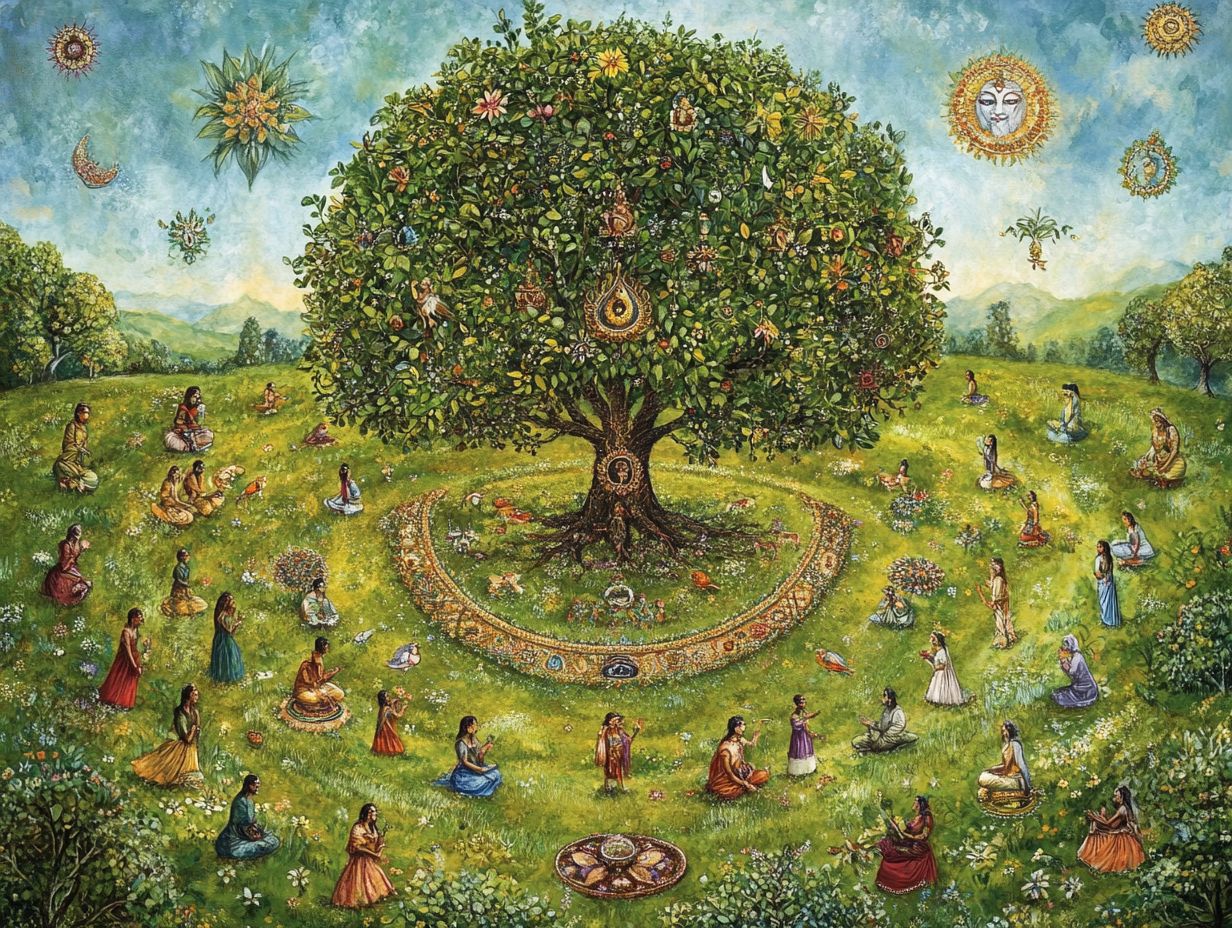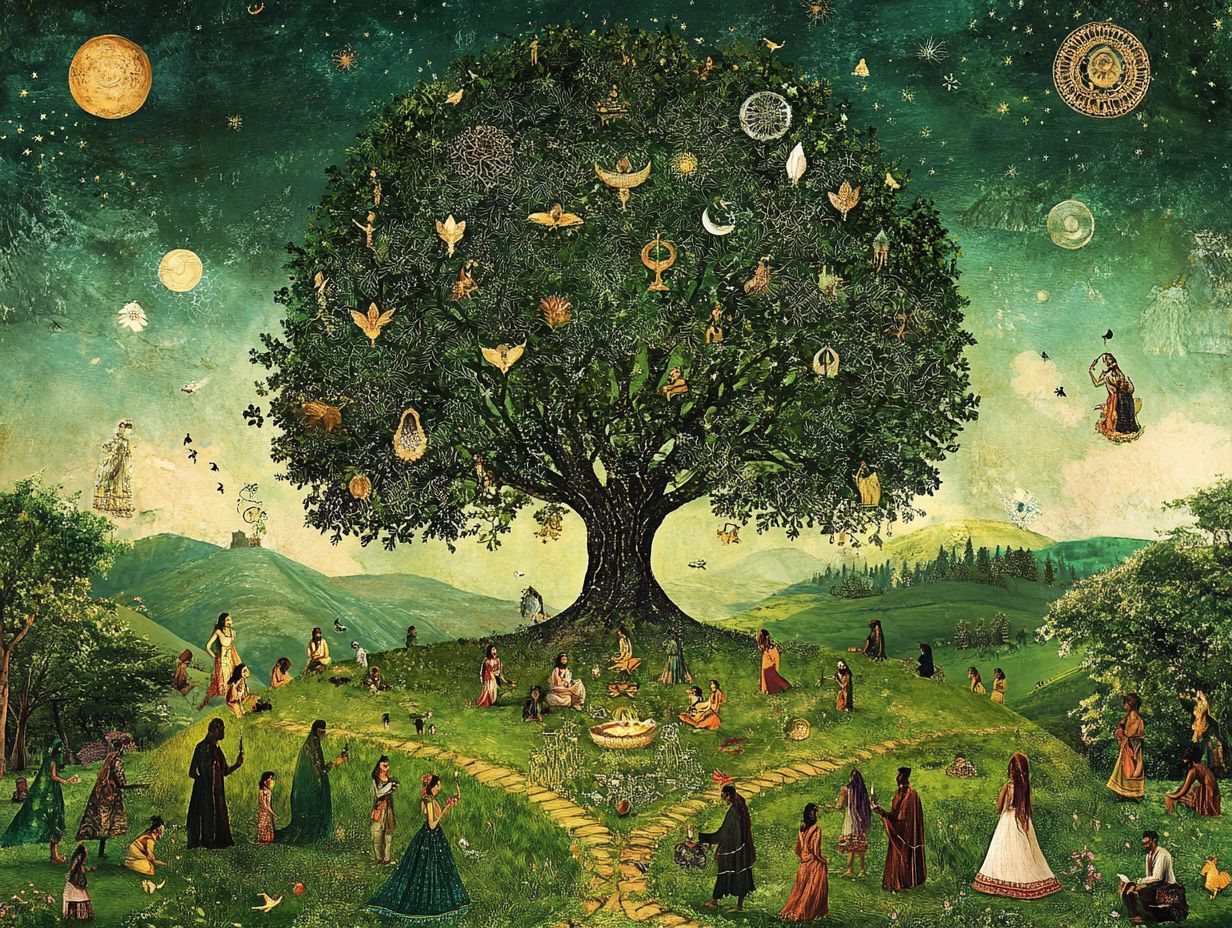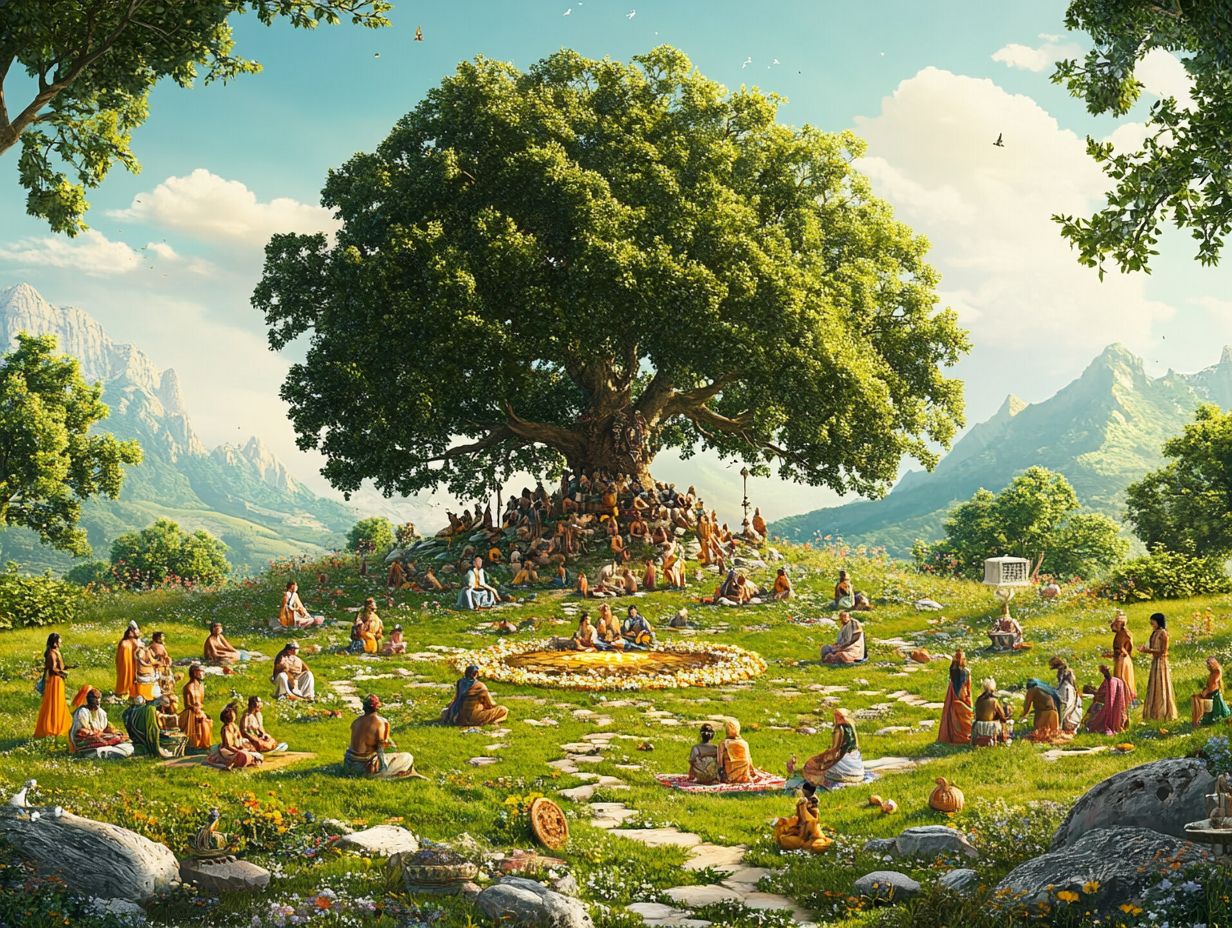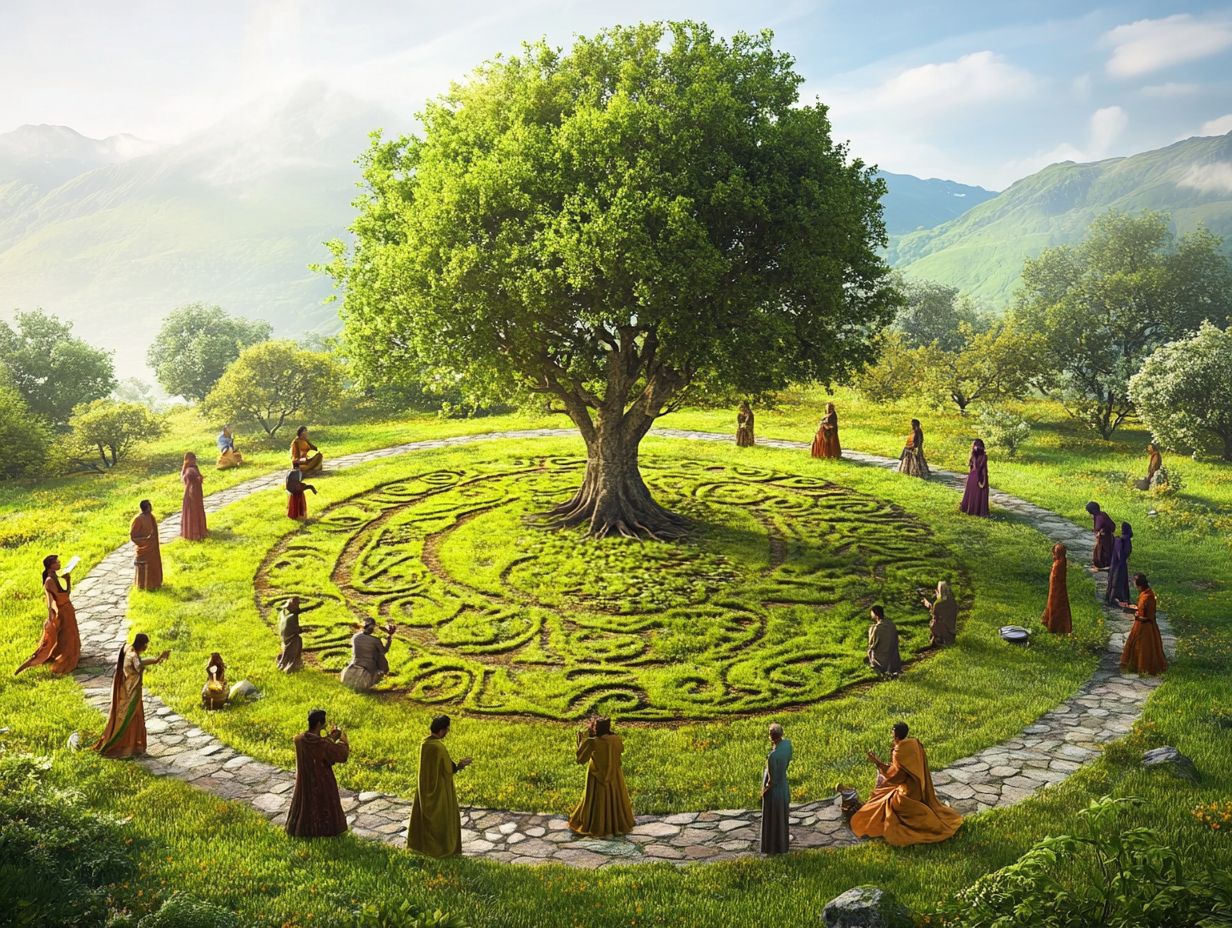Is Paganism Similar to Hinduism?
Paganism and Hinduism, two profound spiritual traditions with rich philosophical inquiries, consistently ignite interest in their similarities and differences.
Both traditions encompass captivating elements such as polytheistic beliefs, reverence for nature, and intricate rituals, yet they are firmly grounded in distinct historical, mythological, and cultural contexts.
This discourse delves into their commonalities, including the fascinating concepts of reincarnation and karma, while also scrutinizing the key differences pertaining to their origins, sacred texts, cosmology, and societal impacts.
Additionally, the intriguing prospect of harmoniously practicing both paths will be explored, tactfully navigating the delicate balance between personal belief, religious pluralism, and cultural sensitivity.
Are Paganism and Hinduism Similar?

Paganism and Hinduism, both steeped in ancient beliefs and cultural narratives, present a captivating exploration of spirituality through their polytheistic foundations, diverse rituals, and profound connections to nature. Paganism encompasses a broad spectrum of earth-centered religions, each with its own unique cultural practices, while Hinduism is deeply rooted in the sacred texts of the Vedas and Upanishads, accompanied by a rich tapestry of mythological narratives featuring numerous deities.
The interplay of spirituality, ethical principles, sacred narratives, and community engagement within these two traditions not only underscores their similarities but also illuminates the distinct characteristics that shape their respective practices and beliefs.
1. Polytheistic Beliefs and Deities
Both Paganism and Hinduism are intricately woven around the concept of polytheism, where multiple deities embody diverse facets of reality, culture, and the human experience, creating a rich tapestry of spiritual diversity and belief systems.
In these traditions, deities are not merely objects of veneration; they symbolize fundamental principles of existence, including creation, destruction, wisdom, and love. For instance, in Hinduism, figures such as Brahma, Vishnu, and Shiva each fulfill vital roles within the cycles of life, embodying the moral lessons associated with creation, preservation, and transformation. Similarly, goddesses like Durga and Kali highlight the divine feminine aspects of power and protection in Hinduism.
Likewise, Paganism is often marked by a profound reverence for nature and its elements, with deities like Gaia personifying the Earth and promoting values of respect and stewardship. Through these divine associations, followers discover guidance and affirmation of ethical conduct, highlighting the influence of the divine on moral codes in everyday life.
2. Nature Worship and Spiritual Ecology
Nature worship serves as a cornerstone of both Paganism and Hinduism, where the reverence for natural elements reflects the core tenets of earth-centered religions and sacred practices that honor the profound interconnectedness of all life.
These traditions celebrate the essence of nature through a variety of rituals and seasonal gatherings, demonstrating a profound understanding of life s cycles and the environment. For example, festivals such as Midsummer in Paganism highlight the sun’s energy and abundance, while Hindu celebrations like Makar Sankranti underscore the significance of the sun’s trajectory and agricultural rhythms. Both traditions also respect nature spirits and emphasize the importance of environmental stewardship.
The symbolism inherent in natural elements whether it is water signifying purification or trees embodying growth and wisdom plays a crucial role in cultivating an ecological mindset. By acknowledging these interconnections, practitioners promote a holistic approach to existence, fostering environmental stewardship, spiritual ecology, and a deeper reverence for the planet that nurtures and sustains us.
3. Rituals and Ceremonies
Rituals and ceremonies hold immense significance in both Paganism and Hinduism, acting as sacred practices that facilitate spiritual embodiment and foster community engagement through the veneration of deities, festivals, and pivotal life events.
In Pagan traditions, rituals are often centered around the cycles of nature, honoring the changing seasons and celebrating moments like the solstices and equinoxes, which deepens one’s connection to the earth. Each celebration is infused with profound meaning, highlighting the importance of community gatherings as participants come together to partake in sacred rites, cultivating a sense of belonging among them.
Hinduism, too, presents a rich tapestry of rituals, encompassing vibrant festivals such as Diwali and Holi, alongside intimate rites of passage like naming ceremonies and weddings. These practices not only pay tribute to divine entities but also instill essential values of harmony, respect, and ethical living. This reinforces the notion that sacred practices are vital for nurturing spiritual growth, dharma, and sustaining communal integrity.
4. Reincarnation and Karma
The concepts of reincarnation and karma hold profound significance within both Paganism and Hinduism, shaping the moral frameworks and philosophical outlooks that guide practitioners through their spiritual journeys, meditative practices, and understanding of life’s cycles.
These interwoven beliefs affect how individuals interpret their actions and their repercussions, nurturing a sense of accountability that transcends the current existence. For adherents, the recognition of karma fosters a sense of duty to make ethical decisions that not only influence their personal spiritual paths but also positively impact their communities and overall spiritual ecology.
In these traditions, the comprehension of reincarnation acts as a catalyst for personal development, prompting individuals to reflect on prior actions and aspire for growth in subsequent lives. This cyclical viewpoint nurtures compassion, empathy, and a sense of spiritual awakening, advancing a perspective that emphasizes the interconnectedness of all beings.
Ultimately, the embrace of these principles culminates in a comprehensive ethical framework that prioritizes collective well-being and ethical principles over individual interests.
5. Influence on Modern Culture

The influences of Paganism and Hinduism on contemporary culture are strikingly visible, particularly in their contributions to alternative spirituality, cultural syncretism, and the myriad expressions of sacred practices that shape modern societal values and ethical principles.
These ancient belief systems have seamlessly integrated into various facets of today’s spiritual landscape, catalyzing a revival of practices such as mindfulness, meditation, and nature-centric rituals. In an era increasingly characterized by the quest for meaning amidst rapid technological advancement and societal transformation, the teachings and philosophies embedded in these traditions inspire individuals to connect with their inner selves, their surrounding environment, and the transcendent aspects of life.
The ethical frameworks emanating from both Pagan and Hindu ideologies advocate for values such as compassion, interconnectedness, and respect for all living beings, thereby enriching contemporary discussions surrounding spirituality, religious identity, and ethical living.
Differences Between Paganism and Hinduism
Although Paganism and Hinduism exhibit several similarities, they diverge markedly in their origins and histories, concepts of divinity, sacred texts, perspectives on the afterlife, and their overall influence on society.
These distinctions underscore the unique characteristics that define each belief system, revealing the rich tapestry of traditions, philosophies, and spiritual teachings that shape their individual identities.
1. Origins and Histories
The origins and histories of Paganism and Hinduism unveil distinct cultural heritages, with Paganism often grounded in ancient earth-centered traditions and animism, while Hinduism showcases a rich tapestry of philosophical inquiry and sacred evolution spanning millennia.
As adherents of these belief systems traverse their spiritual journeys and spiritual paths, they forge deep connections with historical milestones, notably the early Vedic texts in Hinduism, which established the foundations for spiritual practices and societal frameworks. In stark contrast, Paganism draws its essence from a myriad of localized traditions, frequently influenced by agricultural cycles and deities unique to specific regions.
Prominent figures, such as the sages of the Upanishads, have been instrumental in shaping Hindu thought, whereas Paganism embodies a diverse array of practices that reflect a harmonious blend of folklore, shamanism, and community rituals. Anthropological studies have shed light on how these religions adapt to cultural transformations, elucidate the significance of their beliefs, and offer profound reflections on the human experience across civilizations.
2. Concept of God
The concept of God in Paganism often embodies non-theistic beliefs alongside a diverse pantheon of deities, reflecting a rich spiritual tapestry. In contrast, Hinduism presents a complex understanding of the divine through various forms of theism, pantheism, and duality, which highlights its multifaceted nature.
Within Pagan traditions, the veneration of multiple gods gives rise to a multitude of rituals and practices aimed at honoring these diverse spiritual entities. Each deity represents different aspects of life, nature, and the cosmos, creating a vibrant and dynamic spiritual landscape, often intertwining with nature worship and polytheism. This stands in stark contrast to the Hindu approach, where the belief in deities such as Brahman, Vishnu, and Shiva delves into profound philosophical inquiries regarding ultimate reality and the essence of existence.
The intricate framework of the Hindu faith reveals its theological depth, providing adherents with a comprehensive understanding of their connection to the divine and their journey through reincarnation and karma. Thus, while Paganism typically celebrates a variety of spiritual expressions and animism, Hinduism engages systematically with a singular essence of divinity, each belief system offering its own unique interpretation of the sacred and the transcendent.
3. Texts, Scriptures, and Sacred Narratives
Paganism is characterized by the absence of a unified set of sacred texts akin to Hinduism s revered scriptures, such as the Vedas and Upanishads, which offer profound wisdom and guidelines for the spiritual journey. These sacred texts fundamentally shape the ethical principles and practices of Hindu followers.
In stark contrast, the lack of a centralized doctrine within Paganism results in a rich tapestry of beliefs that can vary significantly among different traditions and groups. This diversity not only influences individual spiritual experiences but also impacts the rituals, mythology, and cultural expressions of Pagan communities. Often, these expressions draw inspiration from nature, folklore, and ancestral practices, emphasizing earth-centered and holistic practices.
While Hindu texts provide a comprehensive foundation for ethical conduct and rituals guiding adherents in their devotion and everyday lives Pagan practitioners typically pursue spiritual meaning in a more fluid manner. They often adapt and interpret myths and traditions in a way that resonates with their personal experiences and cultural contexts, allowing for a more individualized spiritual journey and spiritual growth.
4. Views on Afterlife

Paganism often showcases a rich tapestry of beliefs regarding the afterlife, deeply rooted in ancestral worship and mythological narratives, whereas Hinduism places a strong emphasis on reincarnation and the moral implications of karma. These differing views not only influence the spiritual convictions of their adherents but also play a crucial role in shaping their ethical frameworks and philosophical inquiries.
In various pagan traditions, the reverence for ancestors and the natural cycles fosters a lifestyle that cherishes balance and respect for all living beings. Conversely, the Hindu belief in reincarnation engenders a profound sense of responsibility, as individuals understand that their actions hold significant weight on their future existences.
This intricate relationship between life choices and the afterlife compels individuals to contemplate their connections to history and the broader universe, promoting a more meaningful existence characterized by compassion and mindfulness.
5. Influence on Society
The influence of Paganism and Hinduism on society is evident in the cultural identities, sacred rituals, and ethical principles that guide their followers, ultimately shaping community values and practices in diverse contexts around the world.
These two belief systems, each steeped in rich traditions and histories, present unique perspectives that resonate profoundly within their respective communities. For many adherents, the rituals associated with these faiths help cultivate a collective identity through sacred music, sacred symbols, and community gatherings, fostering a strong sense of belonging among practitioners.
The ethical frameworks rooted in these religions often inspire followers to engage with the world in meaningful and compassionate ways, promoting values such as reverence for nature in Paganism and the foundational tenets of Dharma in Hinduism. By diving into these belief systems, one can gain a deeper appreciation for how they inform individual moral choices and collectively shape cultural narratives, sacred storytelling, and societal norms across various regions.
Can One Practice Both Paganism and Hinduism? Exploring Religious Syncretism
The practice of both Paganism and Hinduism presents fascinating discussions surrounding syncretism, individual beliefs, and the intricate boundaries of cultural appropriation within various spiritual communities. This intersection also encourages comparative religion studies, exploring how these ancient religions have evolved and blended over time.
This intersection invites a deeper exploration of how diverse traditions can coexist and influence one another while navigating the complexities of respect and authenticity.
1. Syncretism of Beliefs
The syncretism of beliefs between Paganism and Hinduism allows individuals to forge unique spiritual paths that integrate elements from both traditions, thereby enriching their cultural heritage and personal experiences. This process often involves blending meditative practices, rituals of worship, and symbolism from each tradition.
This blending often manifests in practices such as the celebration of seasonal festivals, where symbols and rituals from both traditions coalesce. For instance, the observance of Diwali alongside Samhain creates a vibrant tapestry of worship that reflects this harmonious fusion. Individuals may also feel drawn to deities from both pantheons, merging their reverence for Hindu gods with the nature-centric spirits of Paganism.
While this fusion can foster a deeper sense of connection and understanding, it also presents challenges, such as the risk of diluted traditions or misunderstandings among more purist adherents. Navigating these complexities necessitates a respectful acknowledgment of the roots and practices involved, ensuring that both sets of beliefs are honored throughout the journey.
2. Personal Beliefs and Practices
Individuals navigating the intricate landscapes of Paganism and Hinduism often cultivate personal beliefs and practices that reflect their spiritual diversity, spiritual symbolism, and distinct journeys within both traditions.
These personal beliefs form the bedrock of how they perceive the divine, ritualize their experiences, and establish connections with nature and community. While both traditions emphasize reverence for the Earth and the interconnectedness of all beings, the specific practices can vary significantly, often incorporating elements of shamanism and sacred spaces.
Many individuals discover that weaving together elements from both Pagan and Hindu rituals enriches their spiritual growth, fostering a more nuanced and adaptable approach to worship, meditation, and self-discovery. This synthesis can also lead to a deeper awareness of philosophical frameworks and metaphysical concepts central to each tradition.
Embracing such diverse influences can lead to a profound understanding of spirituality, encouraging individuals to delve into their beliefs free from the constraints of conventional definitions. This journey often involves exploring sacred art, sacred geometry, and the duality present in various mythological tales.
3. Cultural Appropriation

Cultural appropriation emerges as a contentious issue when examining the intersection of Paganism and Hinduism, invoking ethical considerations related to respect, understanding, and the integrity of community practices. These considerations are essential for fostering interfaith dialogue and religious pluralism.
The implications of this topic are particularly significant as individuals navigate the complexities of intertwining these rich traditions. It becomes imperative for practitioners to engage in a thoughtful manner, ensuring their actions do not disrespect the cultural origins or dilute the sacredness of established rituals. Ethical engagement requires an understanding of the historical context and symbolic meaning behind these practices.
Ethical engagement necessitates a comprehensive understanding of the historical context and significance associated with these practices, promoting a dialogue that honors both traditions while cultivating a genuine appreciation.
For those drawn to integrating elements from both Paganism and Hinduism, approaching this blending with humility and a steadfast commitment to honoring the essence and teachings intrinsic to each faith is essential, paving the way for a more respectful coexistence. This approach fosters a deeper spiritual ecology and a richer understanding of the interconnectedness of all beings.
Frequently Asked Questions
What is the main difference between Paganism and Hinduism? Geographical and Cultural Origins
The main difference between Paganism and Hinduism is their geographical origins. Paganism originated in Europe, while Hinduism originated in the Indian subcontinent.
Are there any similarities between Paganism and Hinduism? Shared Spiritual Elements
Yes, there are some similarities between Paganism and Hinduism. Both religions emphasize the importance of nature and worship multiple deities.
Do Paganism and Hinduism share any common beliefs? Reincarnation and the Soul
Both Paganism and Hinduism believe in reincarnation and the concept of a soul that continues to exist after death.
Are there any significant differences in the religious practices of Paganism and Hinduism? Rituals and Worship Practices
Yes, there are significant differences in the religious practices of Paganism and Hinduism. Paganism involves rituals and ceremonies that revolve around nature and its cycles, often highlighting earth worship and sacred spaces, while Hinduism has a more structured and organized approach to worship with specific rituals, prayers, and sacred texts.
Is there a connection between Paganism and Hinduism in terms of their deities? Symbolism and Characteristics
There is no direct connection between the deities in Paganism and Hinduism. However, some similarities can be seen in the characteristics and symbolism of certain deities and goddesses in both religions, reflecting the divine feminine and spiritual symbolism.
How do followers of Paganism and Hinduism view the concept of morality and ethics? Principles of Compassion and Respect
In Paganism and Hinduism, morality and ethics are seen as essential aspects of spiritual growth and are often based on the principles of compassion, non-violence, and respect for all living beings. These ethical principles are deeply ingrained in the cultural practices and religious traditions of both faith systems.
